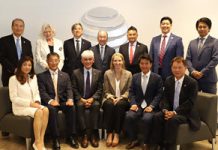
(Post has been updated to reflect the Presidential Proclamation signed March 8)
The California Chamber of Commerce has deep concerns over the impact that a stand-alone tariff on steel and aluminum could have on international trade and the state’s economy.
Far from being part of a comprehensive or strategic plan to improve trade for the United States, the possible tariff is a “one off” that will have adverse consequences and fails to consider the impact on our allies and trading partners.
With the Presidential Proclamation signed on Thursday, March 8 to adjust the steel and aluminum tariffs beginning March 23, Mexico and Canada – our NAFTA partners – were excluded. In addition, the Proclamation leaves the door slightly open for countries with a security relationship to discuss with the United States alternative ways to import. While this is helpful, our reasons for opposing the increase in tariffs remain.
Although trade is a nationally determined policy issue, its impact on California is immense. California exports to more than 225 foreign markets.
Tariff Negatives
Raising tariffs can result in higher prices to the consumer for the specific product protected and in limited choices of products for consumers. Further, it can cause a net loss of jobs in related industries, retaliation by U.S. and California trading partners, and violates the spirit of our trade agreements.
Enforcing the tariff is likely to cause a trade war.
Numerous business and trade groups have voiced their opposition to the potential tariff as well.
The U.S. Council for International Business (USCIB) wrote: “…these protectionist tariffs are likely to cause a chain reaction of retaliatory measures by our trading partners, as many of them have already indicated. Other nations are likely to target our most competitive exports and otherwise disadvantage American companies.”
The National Association of District Export Councils agrees that exports of U.S. goods and services constitute a critical foundation of the U.S. economy. The association points out that while President Donald R. Trump has lamented that the trade and business conduct of certain countries has not always been “fair” to the United States, “the imposition of tariffs, especially in areas like steel and aluminum, critical resources found in the supply chains of many, many businesses, could negatively impact U.S. businesses. The imposition of a tariff does not actually punish the wrongdoer, but operates as a tax, increasing the cost of the imported goods to the user and ultimately to the consumer.”
Support for Free Trade
The CalChamber continues to pursue a free trade-based agenda in 2018. CalChamber has long supported free trade worldwide, expansion of international trade and investment, fair and equitable market access for California products abroad, and elimination of disincentives that impede the international competitiveness of California business.
According to a California state government international trade and investment study, “International trade and investment is a major economic engine for the state of California that broadly benefits businesses, communities, consumers and state government… California’s economy is more diversified than ever before, and the state’s prosperity is tied to exports and imports of both goods and services by California-based companies, to exports and imports through California’s transportation gateways, and to inflows and outflows of human and capital resources.”
Trade offers the opportunity to expand the role of California’s exports. In its broadest terms, trade can literally feed the world and raise the living standards of those around us.
Any rethinking of U.S. trade policies must recognize the gains achieved and ensure that trade remains strong and without interruption. A tariff on steel and aluminum, even with exemptions for Canada and Mexico, has the potential to do significant harm to the ability of California companies to compete effectively in foreign markets. It is a misguided and dangerous policy.

